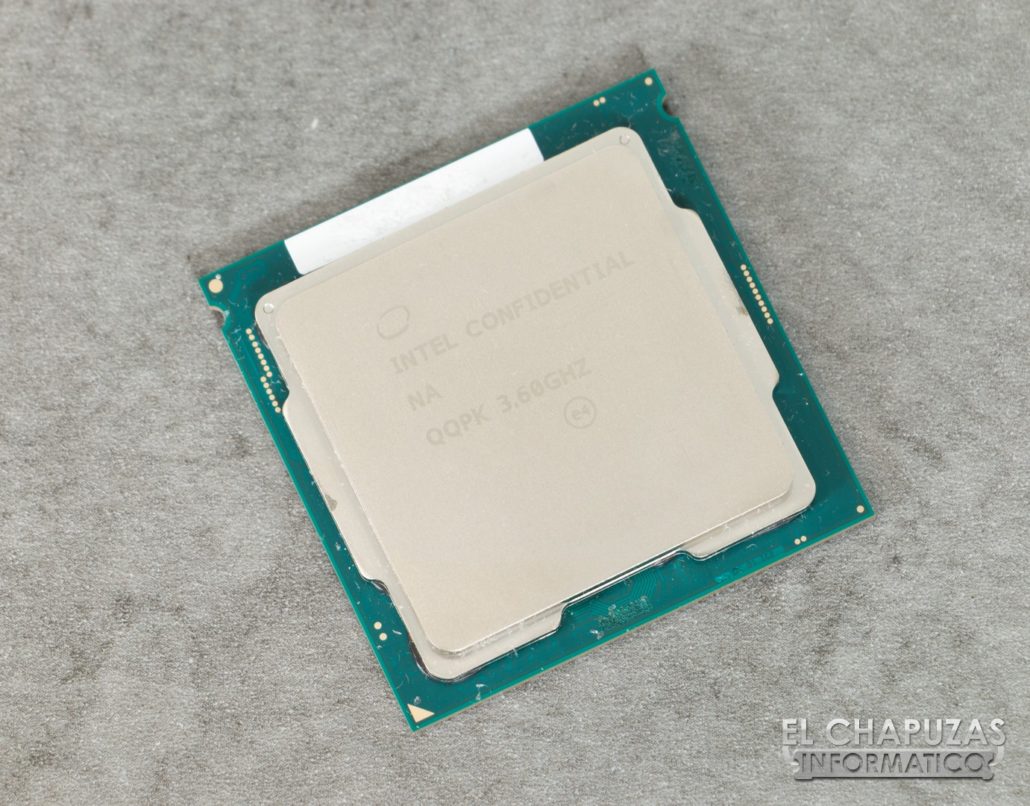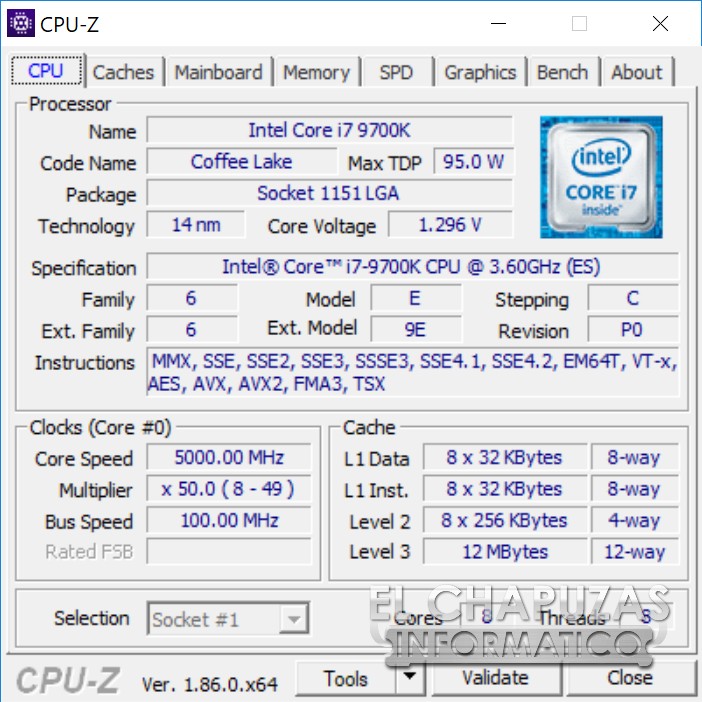Intel Core i7-9700K Performance Results Reportedly Leak
Spanish media outlet El Chapuzas Informático today published a review of the upcoming Intel Core i7-9700K octa-core processor, detailing reported performance results. The review is a first of its kind and should be taken with a grain of salt as it it was published before Intel has even announced an official release date for the new processor.
El Chapuzas Informático looks to confirm what we expected all along. Its Intel Core i7-9700K is an eight-core processor that lacks Hyper-threading capabilities. The chip is clocked at a modest 3.6-GHz base clock, but it's capable of boosting to 4.9 GHz on a single core or 4.6 GHz on all cores. It also has 12MB of L3 cache, 16 PCIe lanes, Intel HD Graphics 630 and a 95W TDP (thermal design power). The Core i7-9700K comes with support for the typical mix of instructions set, such as MMX, SSE, SSE2, SSE3, SSSE3, SSE4.1, SSE4.2, EMT64, VT-x, AES, AVX, AVX2, FMA3 and TSX. So no surprises there.
The Spanish media paired the Intel Core i7-9700K processor with an unreleased, high-end Z390 motherboard (probably an Asus or MSI, judging by the color and design of the VRM heatsinks and rear I/O cover), a pair of G.Skill TridentZ DDR4 modules at 3,600MHz and an MSI GeForce GTX 1070 Gaming Z graphics card.
As tradition dictates, El Chapuzas Informático began its review with a mix of synthetic benchmarks. The Core i7-9700K came out on top on wPrime's single-threaded test, beating Intel's own i7-8700K and AMD's Ryzen 7 2700X. However, it fell behind the Core i7-8700K and Ryzen 7 2700X in wPrime's muli-thread test. As a matter of fact, the Core i7-9700K was no match for the Ryzen 7 2700X or even Ryzen 7 1700X in Cinebench 15 or AIDA64's memory test. The processor did manage to edge out the Ryzen 7 2700X in the x264 benchmark; however, the difference was small and within the margin of error. So, it could have been a fluke.
The Core i7-9700K topped the synthetic graphics benchmarks and real world gaming charts as expected. But to be fair, the Core i7-9700K was only marginally faster than the i7-8700K in gaming; however, it was likely bottlenecked by its GTX 1070 graphics card. El Chapuzas Informático got its engineering sample to 5 GHz on all eight cores by bumping the voltage up to 1.4V. Unfortunately, the Spanish media failed to mention if the processor was completely stable.
We look forward to fully testing Intel's new 9000 series processors when they launch, likely later this fall.
Get Tom's Hardware's best news and in-depth reviews, straight to your inbox.

Zhiye Liu is a news editor, memory reviewer, and SSD tester at Tom’s Hardware. Although he loves everything that’s hardware, he has a soft spot for CPUs, GPUs, and RAM.
-
bit_user Are there any signs indicating whether this is an engineering sample? It seems rather early for a review sample, though seems to perform better than most engineering samples.Reply
I also wonder whether they used a ring bus or the mesh interconnect from Skylake-SP. I'm betting it's a ring. -
AlistairAB These new CPU's are a bust without a price drop. I prefer my 8086k/8700k thank you. The only problem with the 8700k was the price. If this 9700k is the same price, it's pretty boring.Reply -
redgarl So, Intel Hyperthreading removal has a huge impact in the multi-threading department. This is insane, Intel has a lot to lose now. I thought it was crazy with the 14nm fiasco they are living right now, but now it is just sad, I was expecting the complete opposite.Reply
HT was really a scam in providing performance at the expense of security. I cannot believe this. -
Pinhedd Reply21309350 said:Are there any signs indicating whether this is an engineering sample? It seems rather early for a review sample, though seems to perform better than most engineering samples.
I also wonder whether they used a ring bus or the mesh interconnect from Skylake-SP. I'm betting it's a ring.
The "(ES)" means that it is an engineering sample -
nitrium Reply
I wouldn't. I'd wait for the next-gen Cannon Lake which (hopefully) will have all the speculative execution vulnerabilities patched at the silicon level. Or you could wait for Zen 2, which is touted to possibly be better than anything Intel currently offers in the consumer mainstream.21309331 said:Just buy it?
-
TMTOWTSAC Yeah, this product didn't make sense to me from the start. 8c/8t. If you're primarily concerned with single threaded performance it doesn't get you anywhere. If your focus is on multithreading, you're looking at workloads in which Hyperthreading realizes the most gains narrowing the lead over their 6c/12t parts. And that's just against their own product stack.Reply
More than anything, it looks like some sort of ill conceived rebranding and an attempt to drop the 6c/12t parts entirely. -
Krazie_Ivan Reply21309926 said:More than anything, it looks like some sort of ill conceived rebranding and an attempt to drop the 6c/12t parts entirely.
right.
...& where does this CPU fit vs a $240 6c/6t i5k? 25% more chip, but when both are gaming-focused are you going to see much FPS improvement, and at what value? keeping the i7 branding even after removing HT leads me to think the 9700k will remain at/near $340+. if it launches with an i5 replacement price then i'd say it's a good deal, but instead, i think Intel is more likely to pull a Kepler by shifting it's product stack.

